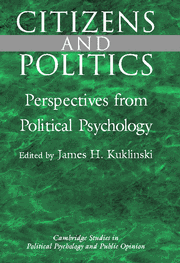Book contents
- Frontmatter
- Contents
- List of Contributors
- Prologue: Political Psychology and the Study of Citizens and Politics
- PART I AFFECT AND EMOTIONS
- PART II POLITICAL COGNITION
- Introduction
- 5 An Experimental Study of Information Search, Memory, and Decision Making During a Political Campaign
- 6 Political Accounts and Attribution Processes
- 7 The Motivated Construction of Political Judgments
- 8 Commentary: On the Dynamic and Goal-Oriented Nature of (Candidate) Evaluations
- PART III POLITICAL ATTITUDES AND PERCEPTIONS
- PART IV POLITICAL VALUES
- Index
- Titles in the series
6 - Political Accounts and Attribution Processes
Published online by Cambridge University Press: 07 October 2011
- Frontmatter
- Contents
- List of Contributors
- Prologue: Political Psychology and the Study of Citizens and Politics
- PART I AFFECT AND EMOTIONS
- PART II POLITICAL COGNITION
- Introduction
- 5 An Experimental Study of Information Search, Memory, and Decision Making During a Political Campaign
- 6 Political Accounts and Attribution Processes
- 7 The Motivated Construction of Political Judgments
- 8 Commentary: On the Dynamic and Goal-Oriented Nature of (Candidate) Evaluations
- PART III POLITICAL ATTITUDES AND PERCEPTIONS
- PART IV POLITICAL VALUES
- Index
- Titles in the series
Summary
Whether alcohol was a factor in these incidents, I do not know. In any event, alcohol at best can only be a partial explanation.
(Senator Bob Packwood, November 27, 1992, in response to allegations of sexual misconduct)As I told the Tower board, I didn't know about any diversion of funds to the Contras. … No one kept proper records of meetings or decisions. This led to my failure to recollect whether I approved an arms shipment before or after the fact. I did approve it; I just can't say specifically when.
(President Ronald Reagan, March 4, 1987, speech on his role in the Iran-Contra affair)I wanted to support Clarence Thomas. The polls in the state clearly favored him. … From a political standpoint, I badly wanted to vote for Clarence Thomas. However, my conscience wouldn't let me do it. I thought she [Anita Hill] was telling the truth.
(Senator Harry Reid, October, 16, 1991, after the Senate confirmation vote for Clarence Thomas's nomination to the Supreme Court)It's no big deal, it's not like molesting young girls and young boys.
(Representative Charles Wilson, March 1992, after it was revealed that he had eighty-one checks overdrawn at the House of Representatives' Bank)I made the decision. I'm accountable. The buck stops with me.
(Attorney General Janet Reno, April 19, 1993, after the Branch Davidians' deaths in Waco, Texas)- Type
- Chapter
- Information
- Citizens and PoliticsPerspectives from Political Psychology, pp. 160 - 197Publisher: Cambridge University PressPrint publication year: 2001
- 20
- Cited by

